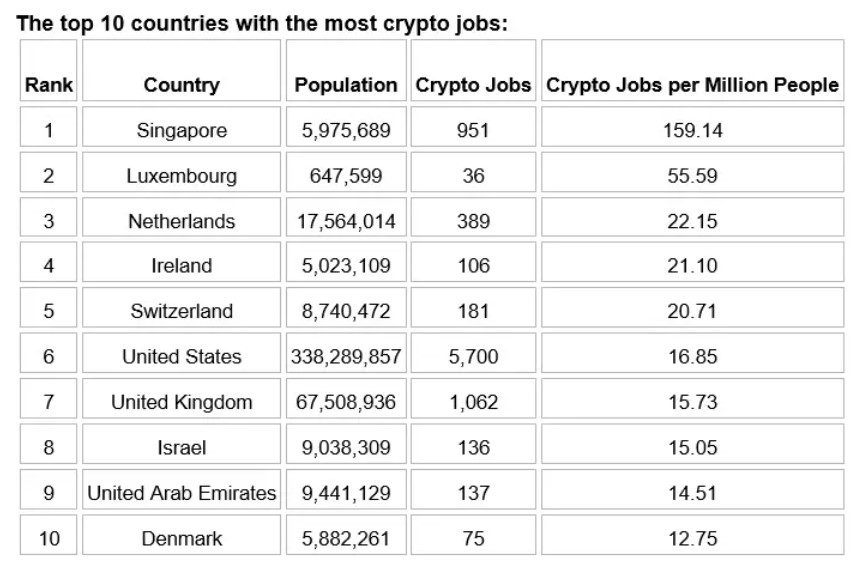UAE Ranks Among Top Crypto Job Markets in the World, Study Reveals

Employment opportunities and salaries in the UAE’s cryptocurrency sector are among the highest in the world, making the Gulf state one of the biggest markets for those seeking a career in the digital currency space, according to new research by London-based CoinJournal.
The UAE has 137 crypto career listings or 14.51 jobs per one million people, which is the ninth highest globally, the research showed. This shows that there are more crypto-related jobs in the UAE than in other markets like Australia, Canada, France or Germany.
When it comes to salaries, pay scales in the UAE are also among the most attractive, with annual pay packets averaging $132,000, the fourth highest in the world. Crypto-related salaries in the country have outranked those in many countries, including the United States, Switzerland, Germany, Australia, Portugal, Hong Kong and Egypt.
Overall, Singapore has the highest number of crypto career listings at 159.14 jobs per a million people, almost three times as many as any other country.
The research also revealed that there are more crypto-related jobs in the US and UK than in other countries worldwide. The data indicated that there are currently 5,700 crypto-related jobs in the United States, while the United Kingdom has 1,062.
Top jobs

As for popular jobs in the crypto space, positions like lead developer, senior developer and smart contract developer have the highest average salary, with an annual pay packet of $120,000.
Blockchain and crypto go to college
Additionally, The University of California has produced the most blockchain business leaders, with as many as 13 being counted among its alumni. In fact, computer science is the most popular course among blockchain business leaders, accounting for 24.55% of all subjects studied, the research showed.
It is also important to note that more students are enrolling in programmes that cover the blockchain space, which is planting the seed in people’s minds and pushing the world to accept and adopt this technology. In fact, while many of the most in-demand jobs in cryptocurrency don’t necessarily require a formal education, many global universities have started offering opportunities to dig deeper into this field. In fact, crypto news outlet CoinDesk recently published a ranking of the top 50 universities for blockchain.
The National University of Singapore ranked first, with Royal Melbourne Institute of Technology in second, University of California Berkeley in third, University of Zurich in fourth and MIT in fifth.
Out of the top 50 schools, 13 are located in the U.S., including Arizona State University (30th) and New York University (41st).
With this in mind, such majors are not that easy, for there are many challenges that come in the way. To start with, more and more students are enrolling in blockchain programmes, yet only a few would like to pursue it as a career.
Most students are simply curious about the new tech and how it could, potentially, give them an edge in their future careers.
“Once something new comes out, I just want to learn it, just to satisfy my curiosity,” said Hare Muthusamy, a grad student studying software development, who moved from India to enroll at UC Boulder.
Olta Andoni, a professor at Chicago-Kent law school, who teaches a course on blockchain, said that most of her students do not take the class with that intent, and she stressed this several times during her call with CoinDesk: “If you are a potential law school applicant, do not go in with the intent to become a crypto-attorney.”
However, others take it more seriously, just like Muthusamy, who didn’t want to just learn about the concepts of blockchain. In fact, he ended up building a decentralized system that allows researchers to anonymously upload papers for peer review, and then a network of academic reviewers – across multiple universities – could anonymously review the study, while having all the material live on the blockchain.
Second of all, lack of information can be a problem, as besides Satoshi Nakamoto’s white paper, only a few source materials that everyone agrees on, exist.
“There’s been a lot of struggle in finding the right source materials,” said Angela Walch, a professor of Law at St. Mary’s, who has been teaching blockchain since 2013.
“Sometimes I’ve been very surprised to find what instructors are using. For example, Walch has misgivings about the use of 2016’s “Blockchain Revolution” by Don Tapscott and Alex Tapscott as a primary text. That’s been very worrying to me, as I view that book as a hype”, she added.
When you teach a course like “maritime law,” the odds are good that every student begins with a similar level of ignorance. But, not with crypto.
Some build their own Ethereum mining servers and others think Bitcoin wallets come in leather”, Adoni added.
In a nutshell, blockchain jobs are now in demand and will be even more in the next few years. The blockchain and crypto space is here to stay, and with blockchain programmes being taught in college, more students are expected to major in the field, which will help in the expansion and adoption of this technology. The world, especially governments, still has a long way to go, but there is no doubt that we are getting there, one block at a time. However, one cannot deny that the UAE, Dubai and Abu Dhabi in specific, are two cities that are worth considering, for a huge part of the blockchain and crypto space is being molded there.
With its regulatory spirit and institutions, the UAE is a very promising space that has been and will continue attracting the biggest blockchain companies in the world.





